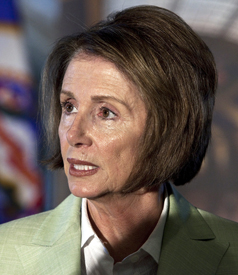Washington – With midterm elections 47 days out, the last few weeks of Congress are all about jobs, especially those created by small business.
Two Republicans broke party ranks Thursday to give President Obama and Senate Democrats a victory on a long-delayed bill targeted to help the nation’s small businesses get back to creating jobs. The House is expected to vote on the Senate version of the bill as early as next week.
“This legislation, which is very important, will help create a half-a-million jobs, it will leverage billions of dollars in lending to small businesses, and it will reduce taxes for small businesses. As soon as we get the bill, we will take it up,” said House Speaker Nancy Pelosi, at a weekly briefing Thursday.
The bill, which passed 61 to 38, includes a $30 billion fund to increase access to lending for small businesses, $12 billion in tax cuts, increased loan limits, and a 90 percent federal guarantee for Small Business Administration loans.
Leading business groups, including the powerful US Chamber of Commerce, backed the bill, but most Republicans did not. “The problem is they’re going about it the wrong way,” said Sen. Orrin Hatch (R) of Utah, after Thursday’s vote. “They tax too much, they spend too much, and they don’t seem to understand the impact of growth of government.”
“Unfortunately, the only jobs the policies of my colleagues on the other side of the aisle have created are government jobs,” added Sen. Charles Grassley (R), during Wednesday’s floor debate on the measure.
Democrats praised Sens. George Voinovich (R) of Ohio and George LeMieux (R) of Florida for providing the votes to break a procedural deadlock or filibuster. “I have to say thank you to George Voinovich, who put his country ahead of his party on this,” said Sen. Barbara Boxer (D) of California. Voinovich was the first Republican to announce support of the bill. He criticized his own party for delaying a vote to defend amendments that had nothing to do with the bill and for partisan “messaging.”
Thursday’s vote is also the opening skirmish to decide whether to extend the expiring Bush tax cuts for all Americans or only for those deemed to be middle class – that is, earning less than $200,000 for individuals and $250,000 for families. The president’s plan increases the two top rates from 33 percent and 35 percent to 36 percent and 39.9 percent. Those in the top income bracket are millionaires and billionaires, who can afford to pay more, Democrats say. Republicans respond that it’s small business owners – the engine of job creation – who will be disproportionately hit if Congress allows the tax cuts to expire, as scheduled, on Dec. 31.
In fact, small business makes up only about 3 percent of taxpayers, or about 750,000 taxpayers, according to Congress’s Joint Committee on Taxation. Moreover, almost 80 percent of small businesses are one person operations, according to a Sept. 3 report by the Congressional Research Service. “It is unlikely that a small tax reduction for these non-employer firms would induce these firms to hire,” the report concludes.
“We have to establish our priority; our priority is the middle class, tax cuts for the middle class,” Pelosi, responding to a question at today’s briefing. “Republicans have made it clear that their priority is no tax cut for the middle class unless there is a tax cut for the wealthiest people in our country.”
On Sunday, House Republican leader John Boehner appeared to open the door to a deal with Democrats when he said he would vote for a bill authorizing only the middle class tax cuts, if that were the only option allowed to come to the floor. Other GOP leaders did not back him, and by Monday Republicans were back on the same page: tax cuts for all.
Now, it’s the Democrats with a rift to close. On Thursday, 31 Democrats wrote a letter to Pelosi that they want the Bush tax cuts renewed for all income groups. “To not extend them all during this particularly difficult time is a bad idea,” said Rep. Earl Pomeroy (D) of North Dakota, who signed the letter.
“The turmoil in the tax issue is inside their caucus, not ours,” said Rep. Tom Cole (R) of Oklahoma.
Join us in defending the truth before it’s too late
The future of independent journalism is uncertain, and the consequences of losing it are too grave to ignore. To ensure Truthout remains safe, strong, and free, we need to raise $50,000 in the next 9 days. Every dollar raised goes directly toward the costs of producing news you can trust.
Please give what you can — because by supporting us with a tax-deductible donation, you’re not just preserving a source of news, you’re helping to safeguard what’s left of our democracy.
